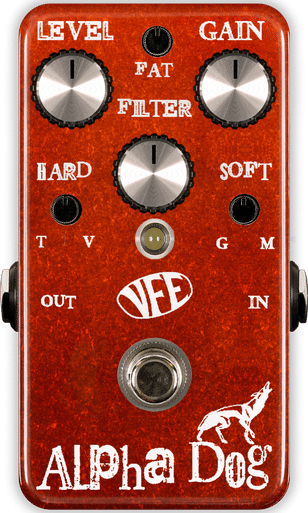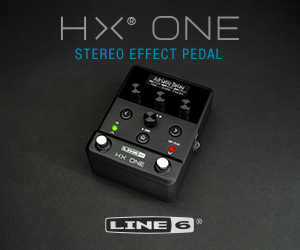30 Pedals in 30 Days: VFE Alpha Dog
Marc Johnson | Nov 08, 2013 | Comments 0
Don’t forget to check out the video at the bottom of the page.
SCIENCE!
Building a pedal is science. Resistors, capacitors, diodes, transistors, potentiometers, switches and jacks, put them all in a pile and most people see a bunch of junk. Peter Rutter of VFE Pedals looks at that same pile and sees possibilities. For 30 Pedals in 30 Days, TheToneKing.com took a look at VFE’s Alpha Dog Vintage Distortion. And, we did so in the name of science!
Talking with Peter Rutter about his pedals is like talking with a mad scientist. He understands how the parts work, and he understands how to put them together. Germanium? Asymmetrical Mosfet? Specifically tapered potentiometers? American-made resistors specifically built for audio use? What the does it all mean? Hell if I know! But, Peter knows, and he knows that these are the necessary ingredients to get the sounds that he’s looking for.
The Alpha Dog is now built with American-made resistors specific built for audio use (made in Iowa by Precision Resistive Products, Inc.) -Peter Rutter
If you think that a resistor is a resistor, then you have some learning to do. One reason why resistor choice is important is because resistors produce noise. Carbon Comp = Bad: Metal Film = Good. Some resistors that are good for other applications would produce too much noise for a distortion pedal. Then, there’s consistency. The resistor needs to be able to perform the same way in a variety of conditions and each resistor needs to act the same way as all the other resistors. Nothing is worse than a rogue resistor.
The Alpha Dog’s “gain,” “fat,” “hard” and “soft” controls are custom-built, American-made potentiometers. Using custom-built potentiometers made sure that the curve was tapered specifically to the needs of the pedal, making it easier for players to dial in a series of great sounds. If the controls weren’t tapered correctly, they would jump in certain spots, giving you a bunch of useless sounds. And, nothing sucks more from a pedal that you spent your hard earned money on than useless sounds.
The custom taper pots help the player fine tune the tone of the pedal. If I had used standard pots, there would be some settings that would have “jumped” very quickly, making it hard to fine the exact tone you want.
While we’re on the subject of “hard” and “soft,” let’s talk about circuit integration. Because both of these controls are integrated into separate parts of the circuit, they can be independent of each other while being used simultaneously. Therefore, they’ll affect the overall sound with more clarity and definition. Both “hard” and “soft” control the “minimum volume” of the compression produced in their respective clipping stages. The “hard” control moves between vintage Rat diodes (V) and twin stacked diodes (T) The “soft” control moves between a single germanium diode (G) and an asymmetrical mosfet (M)
This is a somewhat complex idea to explain. Maybe the easiest way to understand it is that as you turn toward one of the clipping types, it increases its “grip” on the signal. This means it compresses & distorts harder, which in turn reduces the volume output available (there is still lots of boost available, even with lots of compression). At 12:00, there is virtually no impact from the different clipping parts, as if they were removed from the circuit.
Too much science? Well, too bad!
Both of these controls “control the threshold point at which the pedal begins to distort. This means you can use them to set up a very precise dynamic tone that goes from dirty to clean just the way you want it to.” The “fat” control gives players up to 6dB of full range boost and contours the low frequency repsonse of the gain stage.
The Alpha Dog, like all VFE Pedals, include Dual-Mode switching, standard and momentary. This is a little easier to wrap your head around.
Momentary: You put your foot down. The effect goes on. You lift your foot up. The effect goes off.
Standard: You put your foot down and lift it up. The effect is on. You put your foot down and lift it up again. The effect is off.
It’s easy to toggle between the two switching modes. First, don’t touch anything for 3 seconds. This will make sure that the momentary mode doesn’t accidentally get switched off while you are playing. Second, tap+tap+hold for 3 seconds. Third, watch the LED happily blink at you for a job well done.
The Alpha Dog offers a myriad of sounds, and, just like science, some of them can get a bit quirky. For example: Turn the “soft” control all the way to the (G) and add some gain. The distortion burning through that germanium diode will create an octave effect and break up like a starved out fuzz. Some of the most famous sounds were made by experimenting with pedals and getting them to do stuff they weren’t exactly designed for. So, have some fun with it would you?
What does science sound like? VFE’s Alpha Dog Vintage Distortion is the answer to that question. Peter Rutter has put every piece under a microscope before putting it into his pedal. String theory says that every material in the universe can eventually be broken down to a series of intermingling resonating strings. If musicians were scientists, we’d have found a way to put those strings through a pedal and amp so we rock out with the sounds of science. If you want to hear some science, check out TheToneKing.com’s 30 Pedals in 30 Days video where we take a look at VFE’s Alpha Dog Vintage Distortion pedal.
You can buy the Alpha Dog as well as check out all of VFE’s products, here: VFEpedals.com
Click here to enter into TheToneKing.com’s 30 Pedals in 30 Days Randall Give-Away!
Randall Facebook Page: https://www.facebook.com/randallamplifiers
Product Page: http://vfepedals.com/alpha-dog.html
Unboxing Video: http://www.youtube.com/watch?v=BzBaD9GGMYc
Official Full-On Demo & Review: http://www.youtube.com/watch?v=jFQHxXpVVNk
[youtuber youtube=’http://www.youtube.com/watch?v=jFQHxXpVVNk’]
Tiny URL for this post:
About the Author: Marc published his first novel Becoming in 2010. It’s a kick-ass book with monsters and dreams and stuff, and you should buy it. Since then, he’s written thousands of articles for TheToneKing.com, many of which have been picked up for circulation by manufacturers and other news outlets.
His next book, Drugs and Pancakes, should be available early 2014 if his alcoholic editor can find time to work on it in-between destroying his liver and screaming about punctuation. He graduated from Roosevelt University with honors, which means that he’s not as dumb as he looks.
He’s been playing guitar for over 25 years, which is almost twice as long as most of his students have been alive.





















